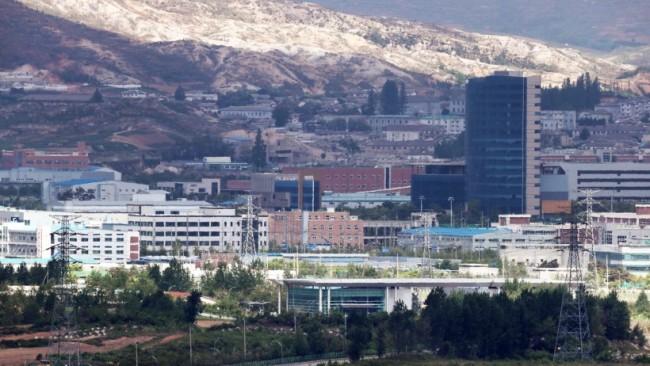[2018 Inter-Korean summit] Kaesong complex hopes flicker, but major obstacles remain
By Jung Min-kyungPublished : April 26, 2018 - 16:21
As the world‘s eyes descend on the truce village of Panmunjeom, the venue of Friday’s inter-Korean summit, another border town seeks to benefit from the talks.
In February 2016, Seoul shuttered an industrial park jointly operated by the two Koreas in the North Korean border town of Kaesong in retaliation for the North’s nuclear test and missile launch. The incident forced more than 120 South Korean businessmen to leave behind their properties, including key facilities and raw materials.
In February 2016, Seoul shuttered an industrial park jointly operated by the two Koreas in the North Korean border town of Kaesong in retaliation for the North’s nuclear test and missile launch. The incident forced more than 120 South Korean businessmen to leave behind their properties, including key facilities and raw materials.

“With the current mood of peace (between the South and North), we now do have higher hopes of returning to Kaesong,” Shin Han-yong, who represents 124 Kaesong tenant companies, told The Korea Herald.
The Kaesong industrial complex was a tangible result of the first inter-Korean summit held in 2000, where 53,800 North Koreans once worked at 124 factories run by South Korean managers.
The reopening of the complex is part of the liberal Moon Jae-in administration’s economic policy goal called the “New Economic Map Initiative of the Korean Peninsula,” which promotes cross-border economic cooperation.
However, despite the thaw on the peninsula, heightened expectations may only result in bitter disappointment, as the resumption of factory operations would involve more than just the two Koreas to realize, according to experts.
When Shin first talked to The Korea Herald last September, he and his fellow businessmen were trapped in a graver situation. North Korea’s military provocations and nuclear tests reached a new height that same month -- its sixth and largest nuclear test triggered the United Nations to slap fresh layers of sanctions on the rogue nation, in a bid to further cut off hard currency from flowing into its nuclear weapons program.
The sanctions -- backed by the United States-led maximum pressure campaign -- not only choked off the North’s economy, but dimmed chances of reviving the joint industrial complex as well. The main reason for the closure of the complex was Seoul‘s suspicion that Pyongyang funneled the money it made there to bankroll its weapons program.
“North Korean sanctions will either have to be partially or fully lifted in order for a stable environment to be formed for the revival of inter-Korean economic projects,” Hong Min, director of the North Korean studies division at the Korea Institute for National Unification said.
“US-North Korea ties will also have to gain traction after a settlement on denuclearization is reached during the meeting between US President Trump and Kim,” he added.
On top of that, a ranking Unification Ministry official told reporters on Tuesday that the long-stalled inter-Korean businesses will not be on the agenda at Friday’s summit and that progress in denuclearization and South-North ties have to be made first in order to address the issue.
Shin agreed with the experts that more time will be needed for the revival of the complex, but expressed frustration.
“We will have to see how the inter-Korean summit turns out, but there’s also the planned summit between the US and North Korea, which is yet to be confirmed,” he said.
“We’ve been waiting and waiting. They say spring has arrived on the Korean Peninsula, but sometimes it feels as if that season is out of our reach.”
“The US bargaining chips in achieving denuclearization of the North used to be focused on diplomacy such as the normalization of diplomatic ties, but there are signs that it may be also considering what the North might want for its economy,” Hong said.
“Unlike previous joint economic projects that were not profit-oriented for the sake of the ‘unique characteristic’ on the Korean Peninsula and managed by the government, projects after the Trump-Kim summit are likely to adopt a more profit-oriented structure, if the deal works out. International banks and consortiums may also join the game and it will cease to be a matter that only involves the two Koreas.”
By Jung Min-kyung (mkjung@heraldcorp.com)








![[KH Explains] Hyundai's full hybrid edge to pay off amid slow transition to pure EVs](http://res.heraldm.com/phpwas/restmb_idxmake.php?idx=644&simg=/content/image/2024/04/18/20240418050645_0.jpg&u=20240419100350)







![[From the Scene] Monks, Buddhists hail return of remains of Buddhas](http://res.heraldm.com/phpwas/restmb_idxmake.php?idx=652&simg=/content/image/2024/04/19/20240419050617_0.jpg&u=20240419175937)

![[KH Explains] Hyundai's full hybrid edge to pay off amid slow transition to pure EVs](http://res.heraldm.com/phpwas/restmb_idxmake.php?idx=652&simg=/content/image/2024/04/18/20240418050645_0.jpg&u=20240419100350)

![[Today’s K-pop] Illit drops debut single remix](http://res.heraldm.com/phpwas/restmb_idxmake.php?idx=642&simg=/content/image/2024/04/19/20240419050612_0.jpg&u=)